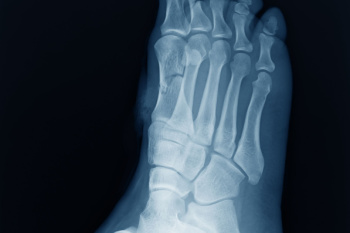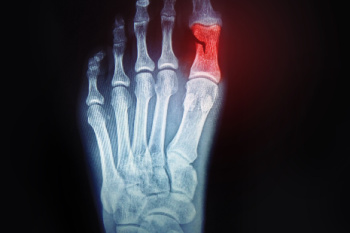Items filtered by date: September 2024
Understanding Cuboid Syndrome in Athletes

Cuboid syndrome is a common but often overlooked cause of lateral foot pain in athletes, particularly in sports involving running, jumping, and sudden direction changes. It occurs when the cuboid bone, located on the outer side of the foot, becomes partially dislocated or misaligned. Athletes may experience sharp pain, swelling, and difficulty bearing weight. Diagnosis involves a physical examination, including palpation of the cuboid area, range of motion tests, and sometimes imaging like X-rays to rule out fractures. Treatment typically starts with rest. A podiatrist may try to realign the cuboid bone with manual manipulation. They may also use taping or orthotics to support the foot and prevent recurrence. If you participate in sports and have pain on the side of your foot, it is suggested that you schedule an appointment with a podiatrist for a proper diagnosis and treatment.
Cuboid syndrome, also known as cuboid subluxation, occurs when the joints and ligaments near the cuboid bone in the foot become torn. If you have cuboid syndrome, consult with Amir Shalev, DPM from Complete Foot & Ankle Care. Our doctor will assess your condition and provide you with quality foot and ankle treatment.
Cuboid syndrome is a common cause of lateral foot pain, which is pain on the outside of the foot. The condition may happen suddenly due to an ankle sprain, or it may develop slowly overtime from repetitive tension through the bone and surrounding structures.
Causes
The most common causes of cuboid syndrome include:
- Injury – The most common cause of this ailment is an ankle sprain.
- Repetitive Strain – Tension placed through the peroneus longus muscle from repetitive activities such as jumping and running may cause excessive traction on the bone causing it to sublux.
- Altered Foot Biomechanics – Most people suffering from cuboid subluxation have flat feet.
Symptoms
A common symptom of cuboid syndrome is pain along the outside of the foot which can be felt in the ankle and toes. This pain may create walking difficulties and may cause those with the condition to walk with a limp.
Diagnosis
Diagnosis of cuboid syndrome is often difficult, and it is often misdiagnosed. X-rays, MRIs and CT scans often fail to properly show the cuboid subluxation. Although there isn’t a specific test used to diagnose cuboid syndrome, your podiatrist will usually check if pain is felt while pressing firmly on the cuboid bone of your foot.
Treatment
Just as the range of causes varies widely, so do treatments. Some more common treatments are ice therapy, rest, exercise, taping, and orthotics.
If you have any questions, please feel free to contact our office located in Las Vegas, NV . We offer the newest diagnostic and treatment technologies for all your foot care needs.
Wounds That Don't Heal Need to Be Checked
Managing Turf Toe

Turf toe affects the metatarsophalangeal, or MTP, joint at the base of the big toe. It is typically caused by a sudden hyperextension of the toe, such as a push-off motion in certain sports, dance, or gymnastics. Turf toe often affects athletes who play on artificial turf, but it can also occur in non-athletic settings. Severity of the injury ranges from a mild stretch of the soft tissue to a complete tear, causing pain, swelling, and limited movement. A podiatrist can assess the extent of the MTP joint injury through a physical exam and, if necessary, imaging tests like X-rays or MRI scans. Treatment may include orthotics or even surgery to ensure proper healing and prevent long-term complications. If you are experiencing pain under the big toe, it is suggested that you schedule an appointment with a podiatrist for an exam, diagnosis, and treatment options.
Toe pain can disrupt your daily activities. If you have any concerns, contact Amir Shalev, DPM of Complete Foot & Ankle Care. Our doctor can provide the care you need to keep you pain-free and on your feet.
What Causes Toe Pain?
Most severe toe pain is caused due to a sports injury, trauma from dropping something heavy on the toe, or bumping into something rigid. Other problems can develop over time for various reasons.
Toe pain can be caused by one or more ailments. The most common include:
- Trauma
- Sports injury
- Wearing shoes that are too tight
- Arthritis
- Gout
- Corns and calluses
- Hammertoe
- Bunions
- Blisters
- Ingrown toenails
- Sprains
- Fractures (broken bones)
- Dislocations
When to See a Podiatrist
- Severe pain
- Persistent pain that lasts more than a week
- Signs of infection
- Continued swelling
- Pain that prevents walking
Diagnosis
In many cases the cause of toe pain is obvious, but in others, a podiatrist may want to use more advanced methods to determine the problem. These can range from simple visual inspections and sensation tests to X-rays and MRI scans. Prior medical history, family medical history, and any recent physical traumatic events will all be taken into consideration for a proper diagnosis.
Treatment
Treatments for toe pain and injuries vary and may include shoe inserts, padding, taping, medicines, injections, and in some cases, surgery. If you believe that you have broken a toe, please see a podiatrist as soon as possible.
If you have any questions please feel free to contact our office located in Las Vegas, NV . We offer the newest diagnostic tools and technology to treat your foot and ankle needs.
Facts About Broken Toes

A broken toe, or toe fracture, occurs when one of the bones in the toe is cracked or shattered due to trauma or excessive stress. Common causes include stubbing the toe, dropping heavy objects on it, or repetitive pressure from ill-fitting shoes. Symptoms typically involve pain, swelling, bruising, and difficulty moving the toe. In some cases, the toe may appear deformed or misaligned. For mild relief, it is vital to rest the injured foot and avoid putting weight on it. Pain may be managed by taking mild pain relievers. Keeping the toe elevated and using a buddy tape technique, where the injured toe is taped to an adjacent toe for support, can also assist in recovery. If you have broken your toe, it is suggested that you promptly schedule an appointment with a podiatrist who can make an accurate diagnosis and provide treatment.
A broken toe can be very painful and lead to complications if not properly fixed. If you have any concerns about your feet, contact Amir Shalev, DPM from Complete Foot & Ankle Care. Our doctor will treat your foot and ankle needs.
What to Know About a Broken Toe
Although most people try to avoid foot trauma such as banging, stubbing, or dropping heavy objects on their feet, the unfortunate fact is that it is a common occurrence. Given the fact that toes are positioned in front of the feet, they typically sustain the brunt of such trauma. When trauma occurs to a toe, the result can be a painful break (fracture).
Symptoms of a Broken Toe
- Throbbing pain
- Swelling
- Bruising on the skin and toenail
- The inability to move the toe
- Toe appears crooked or disfigured
- Tingling or numbness in the toe
Generally, it is best to stay off of the injured toe with the affected foot elevated.
Severe toe fractures may be treated with a splint, cast, and in some cases, minor surgery. Due to its position and the pressure it endures with daily activity, future complications can occur if the big toe is not properly treated.
If you have any questions please feel free to contact our office located in Las Vegas, NV . We offer the newest diagnostic and treatment technologies for all your foot and ankle needs.
Risks of Developing Charcot Foot Neuropathy

Charcot foot is a serious condition that develops in people with diabetes, particularly those with peripheral neuropathy, a type of nerve damage that reduces sensation in the feet. This lack of feeling can prevent individuals from noticing injuries, such as small fractures or dislocations, which can worsen over time. As the damage progresses, it can lead to severe foot deformities, chronic ulcers, and in some cases, the need for surgery. Risk factors for Charcot foot neuropathy include long-term diabetes, older age, low bone mineral density, and a history of foot injuries. Early detection and intervention are vital to managing this condition, and a podiatrist plays a critical role in diagnosing and treating Charcot foot. This medically trained foot doctor may suggest custom footwear, casting, and other interventions to prevent further damage and support healing. If you believe you may have foot problems related to neuropathy, it is suggested that you schedule an appointment with a podiatrist for an evaluation and treatment options.
Neuropathy
Neuropathy can be a potentially serious condition, especially if it is left undiagnosed. If you have any concerns that you may be experiencing nerve loss in your feet, consult with Amir Shalev, DPM from Complete Foot & Ankle Care. Our doctor will assess your condition and provide you with quality foot and ankle treatment for neuropathy.
What Is Neuropathy?
Neuropathy is a condition that leads to damage to the nerves in the body. Peripheral neuropathy, or neuropathy that affects your peripheral nervous system, usually occurs in the feet. Neuropathy can be triggered by a number of different causes. Such causes include diabetes, infections, cancers, disorders, and toxic substances.
Symptoms of Neuropathy Include:
- Numbness
- Sensation loss
- Prickling and tingling sensations
- Throbbing, freezing, burning pains
- Muscle weakness
Those with diabetes are at serious risk due to being unable to feel an ulcer on their feet. Diabetics usually also suffer from poor blood circulation. This can lead to the wound not healing, infections occurring, and the limb may have to be amputated.
Treatment
To treat neuropathy in the foot, podiatrists will first diagnose the cause of the neuropathy. Figuring out the underlying cause of the neuropathy will allow the podiatrist to prescribe the best treatment, whether it be caused by diabetes, toxic substance exposure, infection, etc. If the nerve has not died, then it’s possible that sensation may be able to return to the foot.
Pain medication may be issued for pain. Electrical nerve stimulation can be used to stimulate nerves. If the neuropathy is caused from pressure on the nerves, then surgery may be necessary.
If you have any questions, please feel free to contact our office located in Las Vegas, NV . We offer the newest diagnostic and treatment technologies for all your foot care needs.

